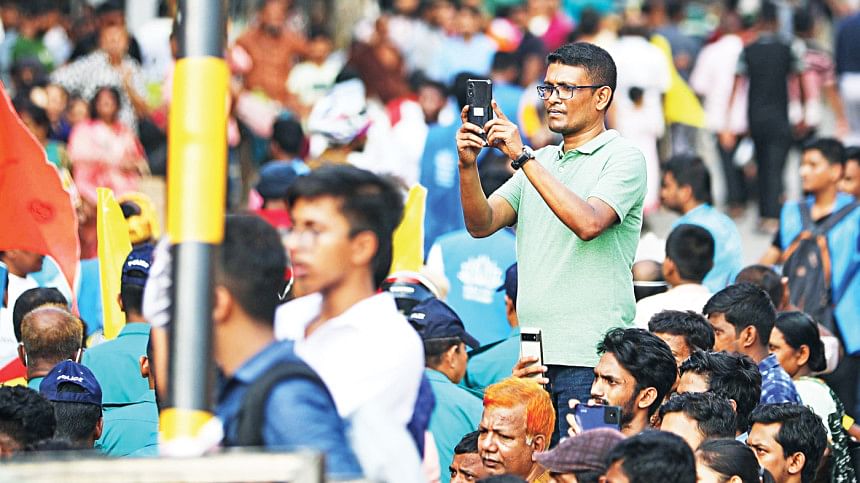Debate heats up over locking SIM slots for smartphone sales on EMI

The major telecommunication companies in Bangladesh and their smaller peers are in a debate over whether they should be allowed to lock all SIM slots when selling smartphones on instalment plans.
SIM slot locking, also known as network lock, is a feature in smartphones that restricts the device's ability to use SIM cards from other carriers.
Mobile operators currently offer smartphones on instalment plans only to select corporate clients.
These do not include the SIM slot locking feature, although the Bangladesh Telecommunication Regulatory Commission (BTRC) in 2023 allowed it, albeit for just one slot, to facilitate instalment-based handset sales.
Overall, the mechanism failed to gain significant traction in the market.
Mobile operators currently offer smartphones on instalment plans only to select corporate clients
In November last year, major operators Grameenphone and Robi formally requested the regulator to allow locking all SIM slots to ensure the instalment payments.
Keeping one SIM slot unlocked makes it impossible to effectively restrict customers from using other SIMs during the period set for instalments. This has made financial partners reluctant to provide funding for such schemes, said the duo.
The operators also demanded flexibility in fixing instalment amounts and periods based on customers' financial conditions or credit scores and preferences for repayment periods.
They also highlighted that a current regulatory condition stipulating that instalment packages can only offer locally manufactured smartphones prevents them from making internationally recognised models available.
Allowing the locking of all SIM slots will help expand affordable smartphone options while ensuring repayment security for instalment plans, according to documents the duo provided to the BTRC.
"Single SIM locking isn't working," Shahed Alam, Robi's chief corporate and regulatory officer, told The Daily Star.
"The current system leaves a scope for customers to default on payments while continuing to use other SIM slots, making the instalment model unsustainable for operators," he said.
This is also discouraging financial partners from taking part in this initiative, he said, adding, "We need locking for all SIM slots to make instalment plans viable."
However, in December last year, Banglalink submitted a counterproposal, urging to maintain the current single-SIM locking system.
The same is advocated by Teletalk, as both apprehend that it would otherwise give the larger operators unfair market power and reduce competition.
The SIM locking feature essentially traps customers within the confines of a single network, limiting freedom of choice, said Taimur Rahman, chief corporate and regulatory affairs officer at Banglalink.
"If big operators, who already have higher profits and financial power, are allowed to lock all SIM slots, it could destroy the competitive balance in our market," he said.
He added that dominant operators might even offer handsets for free or with heavy subsidies, making it harder for smaller players to compete.
Rahman also said reduced competition could result in higher prices for mobile services and fewer choices for consumers in the long run.
"One network should remain open so people have the freedom to choose. Otherwise, it leads to monopoly," he said.
"Dual SIM users would lose flexibility, especially in remote areas with poor coverage. Even international travellers would face difficulties using local SIMs due to roaming restrictions," he said.
Nurul Mabud Chowdhury, managing director at Teletalk, said, "We don't support any policy that restricts customers from using the operator of their choice."
If all SIMs are locked to a single network, it takes away customers' freedom, he added.
However, there could be one approach which allows devices to be unlocked once dues are cleared, ensuring a balanced approach that benefits both customers and financial institutions, said Tanveer Mohammad, chief corporate affairs officer at Grameenphone.
"We aim to make smartphones more accessible by helping customers overcome financial barriers through flexible financing options and contract bundles," he said.
"By collaborating with financial partners, we plan to introduce attractive instalment plans with lenient terms," he said.
"To ensure sustainability and protect against potential misuse or defaults, financed devices should remain locked until the loan is fully repaid," he added.
Amid this debate, the BTRC's Systems and Services Division has submitted a proposal to the commission's highest policymaking body recommending approving the all SIM slot locking feature to boost smartphone penetration.
They argued that this move aims to increase smartphone sales, and thereby enable access to digital services like telemedicine, digital marketing, and agricultural information more easily.
The proposal includes several key conditions — mobile operators would be allowed to lock all SIM slots in devices sold through instalment plans, provided they completely remove these locks once customers complete making all payments.
The proposals also sought to prohibit operators from directly importing or manufacturing handsets and instead ensure that devices are sourced through BTRC-approved manufacturers and importers.
However, the BTRC's top decision-making body has directed the Systems and Services Division to conduct a thorough assessment of the potential market impacts if the all-SIM-locking policy is approved.
Abu Nazam M Tanveer Hossain, a telecom policy expert, said for unbanked populations and people who lack access to formal credit, the network locking model provides a viable financing alternative, driving digital inclusion.
"Introducing such a policy could stimulate competition, expand consumer choice, and rejuvenate the telecom sector. Balancing operator viability with consumer benefits is key to fostering sustainable growth in emerging markets," he said.
It might be a concern for the smaller operators with lower network coverage but smart implementation of this can be utilised to their benefit too, Hossain added.

 For all latest news, follow The Daily Star's Google News channel.
For all latest news, follow The Daily Star's Google News channel. 



Comments